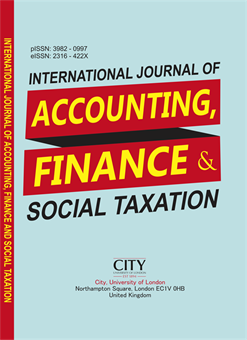INTERNATIONAL JOURNAL OF ACCOUNTING, FINANCE AND SOCIAL TAXATION (IJAFST)
Impact of Entrepreneurial Intention on Entrepreneurial Orientation in SMEs: Mediating Role of Environmental Uncertainty
E-ISSN: 2316-422X
P-ISSN: 3982-0997
DOI: https://iigdpublishers.com/article/301
Entrepreneurial intention is an important concept for understanding and promoting entrepreneurship. It is a strong predictor of entrepreneurial behavior, and it can lead to a number of positive benefits for individuals, society, and the economy. This study aims to examine the impact of entrepreneurial intention (EI) on entrepreneurial orientation (EO). It also examines the intervening role of environmental uncertainty (EU). The data were collected from 150 entrepreneurs from active enterprises in the 3 major cities of Pakistan. The information was gathered through a closed-ended questionnaire. Partial least squares structural equation modeling was used to analyze the data. According to the findings, EI impacts positively on EO and EU. Furthermore, EU plays a significant intervening role between EI and EO. The results of this study offer valuable information that the owners of businesses and the Ministry of Commerce may use to support entrepreneurial activities in Pakistan. This may ensure the efficient operation and elimination of organizations' failure to appropriately launch their businesses.
Shahina Qurban Jan & Tribhuwan Kumar Bhatt
Baron, R. M., & Kenny, D. A. (1986). The moderator–mediator variable distinction in social
psychological research: Conceptual, strategic, and statistical considerations. Journal of
personality and social psychology, 51(6), 1173.
Cai, W., Lysova, E. I., Khapova, S. N., & Bossink, B. A. (2019). Does entrepreneurial leadership foster creativity among employees and teams? The mediating role of creative efficacy beliefs. Journal of Business and Psychology, 34, 203-217.
Chen, C. C., Greene, P. G., & Crick, A. (1998). Does entrepreneurial self-efficacy distinguish entrepreneurs from managers? Journal of business venturing, 13(4), 295-316.
Chen, H., & Tian, Z. (2022). Environmental uncertainty, resource orchestration and digital
transformation: A fuzzy-set QCA approach. Journal of Business Research, 139, 184-193.
Chin, W. W. (1998). The partial least squares approach to structural equation modeling. Modern methods for business research, 295(2), 295-336.
